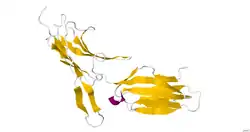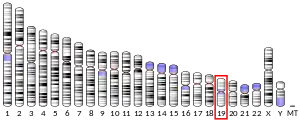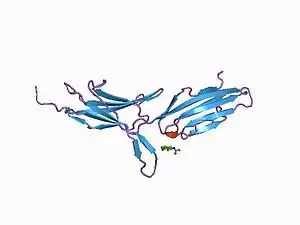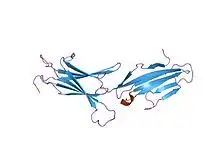Addressin
Mucosal vascular addressin cell adhesion molecule 1 (MAdCAM-1) is a protein that in humans is encoded by the MADCAM1 gene.[3][4][5] The protein encoded by this gene is an endothelial cell adhesion molecule that interacts preferentially with the leukocyte beta7 integrin LPAM-1 (alpha4 / beta7), L-selectin, and VLA-4 (alpha4 / beta1) on myeloid cells to direct leukocytes into mucosal and inflamed tissues. It is a member of the immunoglobulin superfamily and is similar to ICAM-1 and VCAM-1.[3]
Nomenclature
Addressin is a lesser-used term to describe the group of adhesion molecules that are involved with lymphocyte homing, commonly found at high-endothelial venules (HEVs) where lymphocytes exit the blood and enter the lymph node.[6][7] Addressins are the ligands to the homing receptors of lymphocytes.[8] The task of these ligands and their receptors is to determine which tissue the lymphocyte will enter next. They carry carbohydrates in order to be recognized by L-selectin.[9] Addressins physically bind to mobile lymphocytes to guide them to the HEVs.[6] Examples of molecules that are often referred to as addressins are CD34 and GlyCAM-1 on HEVs in peripheral lymph nodes, and MAdCAM-1 on endothelial cells in the intestine.[7]
Function
In terms of migration, MAdCAM-1 is selectively expressed on mucosal endothelial cells, driving memory T-cell re-circulation through mucosal tissues. In contrast, and indeed the main difference between the two molecules, ICAM molecules are involved with naïve T-cell re-circulation. Whereas MAdCAM-1 is selectively expressed, ICAM is broadly expressed on inflamed endothelium.
Peripheral node addressins
Peripheral node addressins (PNAd) are carbohydrate residues that are lymphocyte homing receptor ligands that are expressed on the HEVs of peripheral lymph nodes.[10] These proteins collectively bind to L-selectin to guide lymphocytes such as mature naïve B and T cells into the lymph node.[9][11][12] During the development of secondary lymphoid organs, PNAd expression is upregulated following the upregulation and subsequent downregulation of MAdCAM-1 on HEVs.[12] PNAd expression, as well as the expression of MAdCAM-1, is dependent on lymphotoxin signaling in the HEVs of lymph nodes.[12]
Clinical significance
In inflammatory bowel diseases, MAdCAM-1 can be overexpressed on the endothelial cells of intestinal mucosa and gut‐associated lymphoid tissue, leading to excessive inflammation in the gut.[13] A potential therapeutic target to manage these diseases could be the MAdCAM-1 molecules that are expressed on these cells and bring in lymphocytes. One example of a potential therapy is the fully human monoclonal antibody ontamalimab that targets and binds to MAdCAM-1, preventing it from interacting with the integrins on the surface of the lymphocytes.[14]
References
- GRCh38: Ensembl release 89: ENSG00000099866 - Ensembl, May 2017
- "Human PubMed Reference:". National Center for Biotechnology Information, U.S. National Library of Medicine.
- "Entrez Gene: mucosal vascular addressin cell adhesion molecule 1".
- Shyjan AM, Bertagnolli M, Kenney CJ, Briskin MJ (April 1996). "Human mucosal addressin cell adhesion molecule-1 (MAdCAM-1) demonstrates structural and functional similarities to the alpha 4 beta 7-integrin binding domains of murine MAdCAM-1, but extreme divergence of mucin-like sequences". Journal of Immunology. 156 (8): 2851–7. doi:10.4049/jimmunol.156.8.2851. PMID 8609404. S2CID 24940438.
- Leung E, Berg RW, Langley R, Greene J, Raymond LA, Augustus M, et al. (1997). "Genomic organization, chromosomal mapping, and analysis of the 5' promoter region of the human MAdCAM-1 gene". Immunogenetics. 46 (2): 111–9. doi:10.1007/s002510050249. PMID 9162097. S2CID 9453114.
- Bevilacqua MP (1993-04-01). "Endothelial-leukocyte adhesion molecules". Annual Review of Immunology. 11 (1): 767–804. doi:10.1146/annurev.iy.11.040193.004003. PMID 8476577.
- Punt J (2019). Kuby immunology. Sharon A. Stranford, Patricia P. Jones, Judith A. Owen (Eighth ed.). New York. ISBN 978-1-4641-8978-4. OCLC 1002672752.
{{cite book}}: CS1 maint: location missing publisher (link) - Addressin Archived 2016-12-01 at the Wayback Machine at eMedicine Dictionary
- Berg EL, Robinson MK, Warnock RA, Butcher EC (July 1991). "The human peripheral lymph node vascular addressin is a ligand for LECAM-1, the peripheral lymph node homing receptor". The Journal of Cell Biology. 114 (2): 343–9. doi:10.1083/jcb.114.2.343. PMC 2289069. PMID 1712790.
- Picker LJ, Butcher EC (1992-04-01). "Physiological and molecular mechanisms of lymphocyte homing". Annual Review of Immunology. 10 (1): 561–91. doi:10.1146/annurev.iy.10.040192.003021. PMID 1590996.
- Lechleitner S, Kunstfeld R, Messeritsch-Fanta C, Wolff K, Petzelbauer P (September 1999). "Peripheral lymph node addressins are expressed on skin endothelial cells". The Journal of Investigative Dermatology. 113 (3): 410–4. doi:10.1046/j.1523-1747.1999.00696.x. PMID 10469342.
- Randall TD, Carragher DM, Rangel-Moreno J (2008-03-27). "Development of secondary lymphoid organs". Annual Review of Immunology. 26 (1): 627–50. doi:10.1146/annurev.immunol.26.021607.090257. PMC 2590644. PMID 18370924.
- Arihiro S, Ohtani H, Suzuki M, Murata M, Ejima C, Oki M, et al. (2002). "Differential expression of mucosal addressin cell adhesion molecule-1 (MAdCAM-1) in ulcerative colitis and Crohn's disease". Pathology International. 52 (5–6): 367–74. doi:10.1046/j.1440-1827.2002.01365.x. PMID 12100519. S2CID 38219521.
- Picardo S, Panaccione R (April 2020). "Anti-MADCAM therapy for ulcerative colitis". Expert Opinion on Biological Therapy. 20 (4): 437–442. doi:10.1080/14712598.2020.1691520. PMID 31709847. S2CID 207946274.
Further reading
- Ohara H, Isomoto H, Wen CY, Ejima C, Murata M, Miyazaki M, et al. (December 2003). "Expression of mucosal addressin cell adhesion molecule 1 on vascular endothelium of gastric mucosa in patients with nodular gastritis". World Journal of Gastroenterology. 9 (12): 2701–5. doi:10.3748/wjg.v9.i12.2701. PMC 4612036. PMID 14669317.
- Ikeda S, Kudsk KA, Fukatsu K, Johnson CD, Le T, Reese S, Zarzaur BL (May 2003). "Enteral feeding preserves mucosal immunity despite in vivo MAdCAM-1 blockade of lymphocyte homing". Annals of Surgery. 237 (5): 677–85, discussion 685. doi:10.1097/01.SLA.0000064364.40406.EA. PMC 1514523. PMID 12724634.
- Tan K, Casasnovas JM, Liu JH, Briskin MJ, Springer TA, Wang JH (June 1998). "The structure of immunoglobulin superfamily domains 1 and 2 of MAdCAM-1 reveals novel features important for integrin recognition". Structure. 6 (6): 793–801. doi:10.1016/S0969-2126(98)00080-X. PMID 9655832.
- de Château M, Chen S, Salas A, Springer TA (November 2001). "Kinetic and mechanical basis of rolling through an integrin and novel Ca2+-dependent rolling and Mg2+-dependent firm adhesion modalities for the alpha 4 beta 7-MAdCAM-1 interaction". Biochemistry. 40 (46): 13972–9. doi:10.1021/bi011582f. PMID 11705388.
- Miles A, Liaskou E, Eksteen B, Lalor PF, Adams DH (May 2008). "CCL25 and CCL28 promote alpha4 beta7-integrin-dependent adhesion of lymphocytes to MAdCAM-1 under shear flow". American Journal of Physiology. Gastrointestinal and Liver Physiology. 294 (5): G1257-67. doi:10.1152/ajpgi.00266.2007. PMID 18308860.
- Kimura K, Wakamatsu A, Suzuki Y, Ota T, Nishikawa T, Yamashita R, et al. (January 2006). "Diversification of transcriptional modulation: large-scale identification and characterization of putative alternative promoters of human genes". Genome Research. 16 (1): 55–65. doi:10.1101/gr.4039406. PMC 1356129. PMID 16344560.
- Grayson MH, Hotchkiss RS, Karl IE, Holtzman MJ, Chaplin DD (June 2003). "Intravital microscopy comparing T lymphocyte trafficking to the spleen and the mesenteric lymph node". American Journal of Physiology. Heart and Circulatory Physiology. 284 (6): H2213-26. doi:10.1152/ajpheart.00999.2002. PMID 12586641.
- Fujisaki S, Tomita R, Park YJ, Kimizuka K, Sugitoh K, Inoue M, Fukuzawa M (March 2004). "Semiquantative analysis of expression of mucosal addressin cell adhesion molecule-1 during small bowel graft rejection in rats". Transplantation Proceedings. 36 (2): 348–9. doi:10.1016/j.transproceed.2003.12.010. PMID 15050155.
- Nishimura T (2003). "Expression of potential lymphocyte trafficking mediator molecules in the mammary gland". Veterinary Research. 34 (1): 3–10. doi:10.1051/vetres:2002045. PMID 12588680.
- Ogawa H, Binion DG, Heidemann J, Theriot M, Fisher PJ, Johnson NA, et al. (February 2005). "Mechanisms of MAdCAM-1 gene expression in human intestinal microvascular endothelial cells". American Journal of Physiology. Cell Physiology. 288 (2): C272-81. doi:10.1152/ajpcell.00406.2003. PMID 15483224.
- Ruiz-Velasco N, Guerrero-Esteo M, Briskin MJ, Teixidó J (March 2000). "The alpha(4) integrin subunit Tyr(187) has a key role in alpha(4)beta(7)-dependent cell adhesion". The Journal of Biological Chemistry. 275 (10): 7052–9. doi:10.1074/jbc.275.10.7052. PMID 10702270.
- Di Sabatino A, Rovedatti L, Rosado MM, Carsetti R, Corazza GR, MacDonald TT (May 2009). "Increased expression of mucosal addressin cell adhesion molecule 1 in the duodenum of patients with active celiac disease is associated with depletion of integrin alpha4beta7-positive T cells in blood". Human Pathology. 40 (5): 699–704. doi:10.1016/j.humpath.2008.10.014. PMID 19157500.
- Bowlus CL, Karlsen TH, Broomé U, Thorsby E, Vatn M, Schrumpf E, et al. (November 2006). "Analysis of MAdCAM-1 and ICAM-1 polymorphisms in 365 Scandinavian patients with primary sclerosing cholangitis". Journal of Hepatology. 45 (5): 704–10. doi:10.1016/j.jhep.2006.03.012. PMID 16750586.
- Ambruzova Z, Mrazek F, Raida L, Stahelova A, Faber E, Indrak K, Petrek M (June 2009). "Possible impact of MADCAM1 gene single nucleotide polymorphisms to the outcome of allogeneic hematopoietic stem cell transplantation". Human Immunology. 70 (6): 457–60. doi:10.1016/j.humimm.2009.03.008. PMID 19286444.
- Arihiro S, Ohtani H, Suzuki M, Murata M, Ejima C, Oki M, et al. (2002). "Differential expression of mucosal addressin cell adhesion molecule-1 (MAdCAM-1) in ulcerative colitis and Crohn's disease". Pathology International. 52 (5–6): 367–74. doi:10.1046/j.1440-1827.2002.01365.x. PMID 12100519. S2CID 38219521.
- Shroff HN, Schwender CF, Baxter AD, Brookfield F, Payne LJ, Cochran NA, et al. (July 1998). "Novel modified tripeptide inhibitors of alpha 4 beta 7 mediated lymphoid cell adhesion to MAdCAM-1". Bioorganic & Medicinal Chemistry Letters. 8 (13): 1601–6. doi:10.1016/S0960-894X(98)00286-8. PMID 9873398.
- Dando J, Wilkinson KW, Ortlepp S, King DJ, Brady RL (February 2002). "A reassessment of the MAdCAM-1 structure and its role in integrin recognition" (PDF). Acta Crystallographica. Section D, Biological Crystallography. 58 (Pt 2): 233–41. doi:10.1107/S0907444901020522. PMID 11807247.
External links
- vascular+addressins at the U.S. National Library of Medicine Medical Subject Headings (MeSH)
- Human MADCAM1 genome location and MADCAM1 gene details page in the UCSC Genome Browser.
- Overview of all the structural information available in the PDB for UniProt: Q13477 (Mucosal addressin cell adhesion molecule 1) at the PDBe-KB.
This article incorporates text from the United States National Library of Medicine, which is in the public domain.




